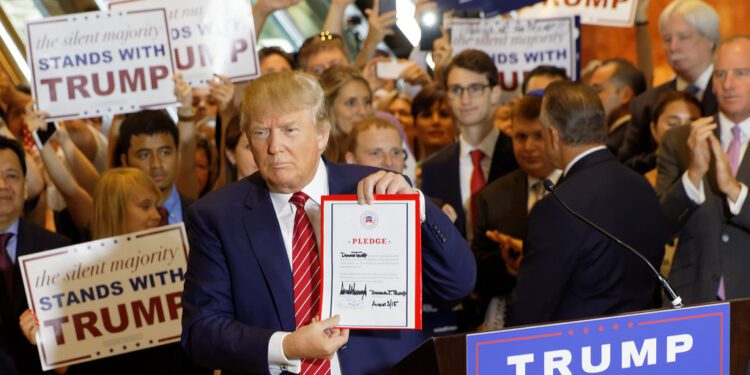The vigorous surge in US equities slowed down on Tuesday as market participants evaluated the extent of the recent uptick and pondered the consequences of President-elect Donald Trump’s Cabinet selections. The Dow Jones Industrial Average (DJIA) dipped nearly 0.8%, losing close to 350 points. The S&P 500 declined by more than 0.2%, while the tech-centric Nasdaq Composite dropped approximately 0.1%, easing earlier declines.
Boeing was among the underperformers in the Dow, dropping over 2.5% due to strikes involving workers in October. Both the S&P 500 and DJIA experienced their most significant losses since October 31. The rest period in equities coincided with a rise in Treasury yields, with the 10-year Treasury yield increasing by around 12 basis points to approximately 4.43%.
Analysts on Wall Street are indicating that the post-election uptick in stocks may soon falter after propelling the major indices to unprecedented heights. Investors have scaled up their stakes in US equities, but worries are mounting regarding the potential policy ramifications of Trump’s anticipated Cabinet appointments. Bitcoin’s record-setting rally persisted, with the cryptocurrency approaching $90,000 at market close.
By 4 p.m. ET, bitcoin was trading at about $89,600 per coin. Investors are on alert to see if it breaks the $90,000 threshold for the very first time in overnight trading. Meanwhile, the so-called ‘Trump trade,’ which saw upswing in cryptocurrency-related stocks and Tesla since Trump’s election victory, took a pause.
Shares of Coinbase, which facilitates cryptocurrency trading, fell by over 2%. Similarly, Robinhood, another platform offering crypto trading, saw a decline of approximately 1% on Tuesday after a major rally. Tesla, which had previously surged more than 40% over the last five sessions, decreased by over 5%.
Neel Kashkari, President of the Federal Reserve Bank of Minneapolis, indicated that surprises in inflation data could lead the central bank to reconsider its interest rate reduction strategy.
Impact of Trump’s nominees on market sentiment
“It’d be challenging to envisage the labor market significantly heating up between now and December,” Kashkari remarked.
“A substantial surprise on the inflation front would be required to drastically alter the outlook.” Current market expectations place a 59% probability on the Federal Reserve cutting interest rates in its December meeting. Boeing’s stock plummeted as much as 3% on Tuesday following a sharp decline in October deliveries caused by a seven-week strike by its principal union, which hampered much of its output. The drop in deliveries underscores the production disruptions that occurred during the strike, which concluded last week but cost Boeing billions in lost revenue and temporarily hindered its recovery efforts.
Brian Moynihan, CEO of Bank of America, endorsed Federal Reserve Chairman Jerome Powell’s viewpoint on preserving the independence of the central bank from political pressures. “Ultimately, having an independent central bank is advantageous,” Moynihan stated. “We must exercise caution because countries lacking such independence tend to struggle more.”
As of Tuesday, all major averages were trading close to session lows just prior to 12:30 p.m. ET.
The Dow Jones Industrial Average declined by about 0.6%, erasing more than 250 points, while the S&P 500 fell approximately 0.4%, and the Nasdaq Composite reduced by around 0.3%. Treasury yields also increased, with the 10-year Treasury yield nearing 4.42% and the 2-year Treasury climbing to its highest point since late July. In other developments, Snap stock dropped roughly 4% on Tuesday following news that President-elect Donald Trump is expected to attempt to prevent a potential U.S. ban on TikTok.
Snap, which competes directly with TikTok, had been anticipated to benefit from a potential U.S. ban on the highly popular short-video application. Consumer inflation expectations are continuing to decrease, with a new October survey from the Federal Reserve Bank of New York indicating expectations of 2.9% in one year, marking the lowest one-year forecast in four years. This trend aligns with other surveys that also reflect lower inflation expectations.
Rick Rieder, Chief Investment Officer of Global Fixed Income at BlackRock, shared his thoughts on the elevated price-to-earnings ratios in the market. “I’m not particularly fond of the multiple” on stocks, Rieder remarked, mentioning that strong demand for equities through 401(k) contributions and corporate buybacks is creating a bullish technical environment for stocks. “Companies are repurchasing a significant amount of their shares, and there’s a lack of sellers,” Rieder noted.


